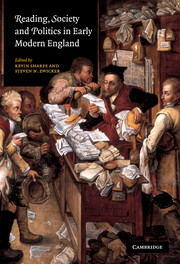Book contents
- Frontmatter
- Contents
- List of illustrations
- List of contributors
- Acknowledgements
- Introduction: discovering the Renaissance reader
- Part I THE MATERIAL TEXT
- Part 2 READING AS POLITICS
- Part 3 PRINT, POLITICS AND PERFORMANCE
- Part 4 READING PHYSIOLOGIES
- Part 5 READING IN THE TIME
- 9 Martial, Jonson and the assertion of plagiarism
- 10 The constitution of opinion and the pacification of reading
- 11 Cato's retreat: fabula, historia and the question of constitutionalism in Mr Locke's anonymous Essay on Government
- Index
10 - The constitution of opinion and the pacification of reading
Published online by Cambridge University Press: 22 September 2009
- Frontmatter
- Contents
- List of illustrations
- List of contributors
- Acknowledgements
- Introduction: discovering the Renaissance reader
- Part I THE MATERIAL TEXT
- Part 2 READING AS POLITICS
- Part 3 PRINT, POLITICS AND PERFORMANCE
- Part 4 READING PHYSIOLOGIES
- Part 5 READING IN THE TIME
- 9 Martial, Jonson and the assertion of plagiarism
- 10 The constitution of opinion and the pacification of reading
- 11 Cato's retreat: fabula, historia and the question of constitutionalism in Mr Locke's anonymous Essay on Government
- Index
Summary
My subject is the conduct of reading at the close of the seventeenth century, but I want to draw an arc over habits of reading from Renaissance humanism to the mid-eighteenth century in order to set the late seventeenth century within a broad chronology and continuum of social practices and intellectual protocols. Such a context will help us to understand the formation and the long history of reading practices as well as the habits of particular moments. It will also suggest why the creation and prizing of opinion – the recognition and the critique of opinion as a sphere of social exchange – should emerge simultaneously, late in the seventeenth century, with the fashioning of increasingly passive consumers of texts. Charting the confluence of reading and opinion allows us to explore relations between the consumption and production of texts and ideas, perhaps even to explain how and why different spheres of mental activity get articulated together. Indeed, the creation and valorization of opinion might be seen as intimately tied to and dependent on a pacification and mechanization of humanist habits of reading.
In The Battle of the Books Swift dramatized the contest between the ancients and the moderns, between learning and opinion, as armed conflict on the shelves of the royal library at St James's Palace.
- Type
- Chapter
- Information
- Reading, Society and Politics in Early Modern England , pp. 295 - 316Publisher: Cambridge University PressPrint publication year: 2003
- 23
- Cited by

